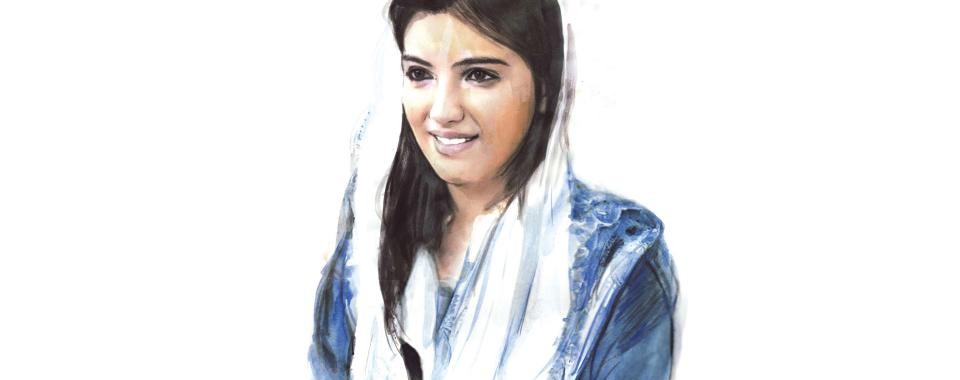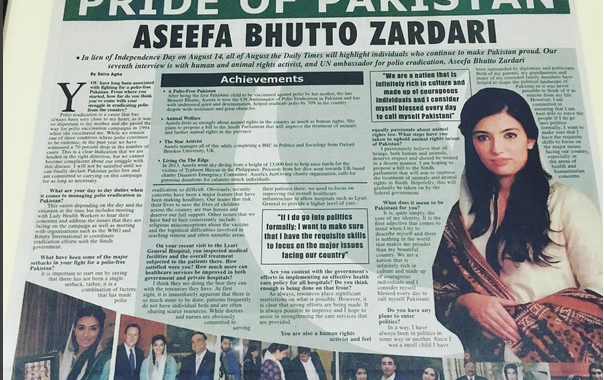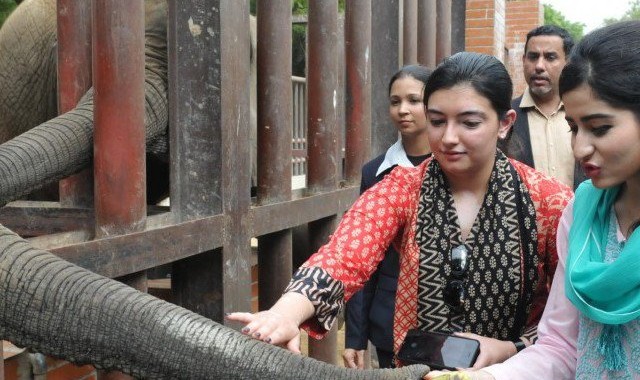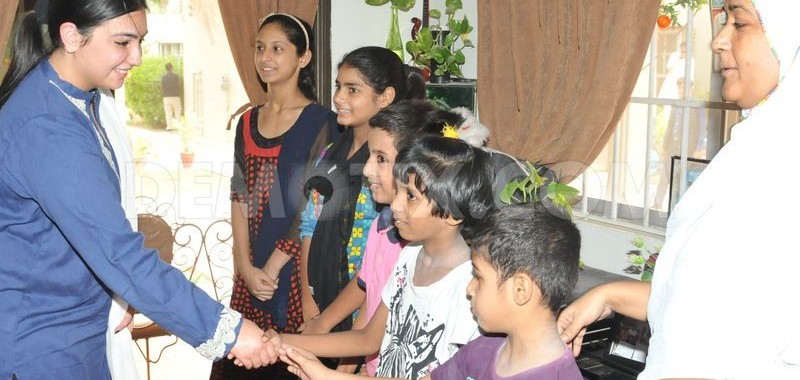Aseefa Bhutto Zardari visited Lyari General Hospital on the 12th of October, 2015 and met with many young doctors who told me themselves they want to stay in Pakistan and work for Lyari and other areas that are lacking doctors.
Tag Archives: aseefa
Aseefa Bhutto Zardari’s interview with the Rotary Club
Find Aseefa Bhutto Zardari’s interview with the Rotary Club below. She is the official Rotary Polio Ambassador.
Before her family was forced into exile, before her mother was assassinated, before her father became president, Aseefa Bhutto Zardari was known for something simpler, but in some ways equally powerful: In 1994, she became the first child in Pakistan to receive the oral polio vaccine, as part of the country’s first National Immunization Day. Benazir Bhutto, then prime minister, gave the drops to her daughter herself, a compelling endorsement of the nascent campaign.
“I was a baby at the time, so I don’t remember it,” says Bhutto Zardari, now 22. “But the moment was an inspirational one for the nation, and encouraged women to believe that polio drops were and are safe.”
In 1988, at age 35, Benazir Bhutto became the first woman elected to lead a Muslim country. She was assassinated in 2007, just months after she had returned to Pakistan after almost nine years in exile. But Aseefa Bhutto Zardari – whose father, Asif Ali Zardari, served as president of Pakistan from 2008 to 2013 – is carrying on her mother’s work. As a Rotary polio ambassador, she meets with officials, visits schools, and talks with families of health workers who were killed while working to vaccinate children.
Bhutto Zardari has raised the profile of the polio eradication campaign in Pakistan and around the world. She writes about the topic for the Huffington Post and joined Rotary International General Secretary John Hewko onstage at the 2012 Global Citizen Festival in New York City’s Central Park. On Twitter, with more than half a million followers, she encourages people in Pakistan to support ending polio and chastises those who stand in the way. In April, she invited two other prominent women in Pakistani politics to join her in the polio eradication effort, a move that garnered media coverage across the country.
In 1994, the year Bhutto Zardari received those first drops of vaccine, Pakistan had an estimated 35,000 cases of polio. As of 10 June, 24 cases had been reported in the country in 2015. Bhutto Zardari, who is completing a master’s degree in global health and development in London, talked to us about ending polio in Pakistan, her future in politics, and prospects for peace in her country.
THE ROTARIAN: Recently in Pakistan, some parents who refused the polio vaccine for their children have been arrested. Are those arrests justified?
BHUTTO ZARDARI: There is a great ethical debate about whether the arrests are justified. Is it the right of the citizen to refuse care? Is it the right of the child to have the best health care? Personally, I don’t believe arresting people is the best solution. Parents want the best for their children, and they are trying to ensure their safety. Educating the parents and persuading them to let their children have the polio drops is more powerful and, although time consuming, will be more successful in the long term.
TR: You’re active on Twitter. If you could use more than 140 characters on Twitter to send a message to parents who choose not to vaccinate, what would you say?
BHUTTO ZARDARI: In the media environment today, so much of our lives and what we seek to do is oversimplified, often stripped of meaning and context. Much of what I say on Twitter about this topic [of vaccination] is directed at people in positions of influence who are abusing their position by taking an anti-vaccination approach, rather than at individual parents. I know that the majority of parents, even those refusing vaccinations, have their children’s best interests at heart.
To parents who have held off on vaccinating: Do not take rumors as truth or let people use health as a political or religious weapon. Your children’s lives are at risk, and by giving them two small drops, you can ensure they will avoid the suffering that polio can cause. Speak to families who have experienced polio personally. Talk to the polio workers and learn from them.
If we had to reduce it to a campaign slogan, I would say to those parents: Don’t rob your children of a future they deserve. Give them a chance. Let them get the polio vaccine.
TR: What is the future of the polio eradication campaign in Pakistan? How will you continue your involvement?
BHUTTO ZARDARI: There is a serious disconnect between the significant and targeted efforts put in by the provincial governments and the hands-off approach taken by the federal government. To ensure the best chance of success, we need collaboration with the federal and provincial governments in order to have a united front. Along with this, we need to focus on training more lady health workers [a program launched by Benazir Bhutto that has trained more than 100,000 women to provide community health services] and polio workers. These health care workers will be able to use their expertise to support other areas of our health service in the future, and we need to plan for this. I am committed to a polio-free Pakistan, but I’m also committed to a healthier Pakistan overall. For now my focus is on polio, but I hope to carry on my training to get involved in other areas of health care.
This campaign needs more resources, especially in the environment of fragile security that so many of our heroic vaccinators face. The PPP [Pakistan People’s Party, founded by Bhutto Zardari’s grandfather, Zulfikar Ali Bhutto] recently proposed that donors fund a security health corps to protect vaccinators as they attempt to reach children in dangerous areas. This is crucial to protect the lives of our vaccinators and to ensure the success of the program. I often hear of vaccinators returning from high-security-risk areas, such as Quetta, who were unable to reach children because of the danger. The conventional methods of taking the program forward may not be enough if we do not simultaneously address the security concerns.
TR: Will you go into politics?
BHUTTO ZARDARI: I have always been in politics. Since I was a child, I have been surrounded by it. With a mother who was prime minister twice and a father who served as president, it is impossible to avoid politics. I am keen to make my own mark and ensure that I have the skills to best serve Pakistan in the future. That is why I have dedicated so much effort to my education, specifically focusing on health care and humanitarian concerns.
TR: What was it like to grow up in exile?
BHUTTO ZARDARI: I spent a good portion of my life in Dubai. It was difficult to see the struggles my mother faced being away from our home. At the same time, it was inspiring to see how she was able to maintain a presence in Pakistan while in exile. My father was in jail, and she was petitioning leaders worldwide to help bring democracy back to Pakistan. Despite all of that, she always made the effort to help my siblings and me with our homework, and attend our school functions and plays. We were always hoping to return home, but she made sure we never felt lost.
TR: Your grandfather was executed under a military dictatorship, your father was jailed, your mother was killed. What drives you to risk your own security by staying involved? Why not walk away?
BHUTTO ZARDARI: Walking away is not an option. My mother, father, grandparents, aunts, uncles, brother, and sister have all committed themselves to serving Pakistan. They have all believed that they could have a positive impact. While to many, they are simply political figures, they are my family. I trust them, and they have shaped who I am. I will carry on the cause that they have believed in, and that many of them have died for, to honor them and to serve my country.
TR: What prevents you from focusing on the tragedy you have experienced?
BHUTTO ZARDARI: While there has been great tragedy in my life, I am also aware that I have been given great opportunities. I have been able to study, I have been able to travel, and I have been able to create friendships with people from all over the world. I have also been blessed with an incredible brother and sister and a wonderful father. The support I get from my family is a great comfort.
TR: One of your mother’s legacies was inspiring women and girls, including Malala Yousafzai, who calls your mother her role model. What will it take to develop more female leaders in Pakistan?
BHUTTO ZARDARI: Just as I have been blessed to have such an inspiring mother, I feel blessed to have had the opportunity to get to know Malala. She is exactly right in identifying how we will empower women to take the lead in Pakistan in the future: education. We must ensure that women and girls have access to quality education so they are able to obtain leadership positions. At the same time, we must make sure that men and boys are being educated about equality.
TR: Will your country and the region ever see peace?
BHUTTO ZARDARI: I have great faith that one day Pakistan will have peace. I pray for the day when people can look beyond the bombs and the bullets and see my beautiful country, where the people have so much talent and bravery. It is a region in deep transition. One can only hope that the challenges of rapid population growth in South Asia will motivate leaders to strive harder for peace, and that we will be able to work with our neighboring countries to form a more stable and safe environment for our families.
Host an event for World Polio Day on or around 24 October and spread the word in your community about Rotary’s role in the campaign to eradicate polio. During your program, watch an update on the state of polio at endpolio.org.
By Diana Schoberg
The Rotarian
20-Aug-2015
Pride of Pakistan
Aseefa Zardari Bhutto’s interview published on the Daily Times on Friday, August 7, 2015 in the ‘Pride of Pakistan’ section. The ‘Pride of Pakistan’ section was published during the Independence day celebrations highlighting individuals who continue to make Pakistan proud. To read the interview, click here
Visit to Karachi Zoo
I visited the Karachi Zoo on the 7th of July 2014. It was fun spending time with some families who were picnicking. Then I inquired about animal health and how it can be improved.
Visit to SOS Village
Aseefa Bhutto Zardari visited the SOS village on the 3rd of July 2015. She announced to provide for all the needs of the children living in the village out of her own pocket. Aseefa mingled with the children and distributed gifts among them. She also asked the management of SOS Children’s Village about the needs of the children.
Aseefa Bhutto Zardari’s Article in the Huffington Post
Abolishing Polio’s Hold on Pakistan
2015, the year Pakistan aspired to eradicate polio in, has seen six new cases emerge in just the first month.
For those who see Pakistan through “Homeland”-style stereotypes, the march of a polio epidemic simply adds to the layers of crises that we get branded with. But even for Pakistan-watchers who privilige nuance over sensation, the question of why our country continues to grapple with a disease that has been preventable for over half a century, certainly begs an answer.
With cases continuing to rise and violence against health workers becoming increasingly common, the threat posed by polio to our children is both great and unprecedented. There can be no argument on the level and urgency of focus needed on its eradication.
So what contributes to our country’s ineffectiveness in eradicating this disease?
When talking about polio in Pakistan the first point of discussion is almost invariably the security threat that now just goes with the territory, as it were. Vaccinators today face serious security risks. However, while this is a key factor in why this disease continues to plague our nation, it is not the only one. Along with security concerns, there is also significant religious stigma, inconsistent government commitment to eradication efforts and, after years of targeted efforts, an element of campaign fatigue.
Perhaps the most important element in ensuring that the polio eradication campaigns have the best chance of success is unequivocal support from the government. Health care has consistently been an area of focus for PPP governments, illustrated by efforts like the Benazir Income Support Programme which has continued on under the current government and regardless of whether they change the name it was, is and always will be the Benazir Income Support Programme. Specifically for polio, PM Yusuf Raza Gilani and former President Asif Ali Zardari both endorsed the National Emergency Action Plan, launched in 2012. Polio cases dropped precipitously: according to the Global Polio Eradication Initiative, Pakistan in 2014 had a total of 306 cases compared to 93 in 2013 and 58 in 2012. There was a clear and dedicated commitment to removing polio as a threat to our children.
With the transitionary impact of an interim caretaker government and suspension of the PM polio cell, an invaluable part of the momentum driving efforts to combat polio was lost. Surveillance, communication efforts and vaccination programmes faltered in all provinces. While some developments have been made under the current government, including the creation of a mandatory polio certification programme, lack of government oversight and checks on the system have led to abuses. Reports of families being charged for polio drops that are, and always will be, free are unacceptable and must be addressed.
Understandably, campaign fatigue has also become an issue. When meeting polio workers one of the complaints that arose during a campaign was, “why are you just giving polio drops? My children are at risk of other diseases and you came here last month”. Both health workers and the people can see we have far more to deal with than one disease. If we can tackle the mind-set leading to refusals of polio drops, we can remove an entire disease and redeploy the resources to other areas within our health system that are desperately in need of them. Education is one aspect: everyone leader from across the religious and political spectrums claims to support the polio campaigns, however, it is still common to have drops rejected on religious grounds. We need these leaders to come out and join our country’s health programmes and help secure our children’s future.
And finally, security. The overwhelming threat faced daily by our health workers is a harsh burden that they deal with continuously. Since the first attack on polio workers there have been repeated attacks on polio workers across the country. Even without the security threat, we are a country that is struggling with human resources in health care as we face shortages in almost all fields. And yet, during my four and a half years as Polio Ambassador for Pakistan by the United Nations, I have witnessed the unwavering commitment of these polio workers in the face of such adversity and open hostility. One cannot help but be touched by their stories: one health worker I met had refused polio drops to her child who later contracted polio. Since that time she has gone door to door during every campaign in her province to try and spare other mothers from suffering the hardship she had to endure. Another worker takes her child with her during campaigns and proves to mothers in front of them that her child has taken it therefore they should. This was based on the example my mother Shaheed Mohtarma Benazir Bhutto set when she gave me the first oral polio vaccination (OPV). Their stories and actions leave no doubt in my mind that we as a nation are capable of eradicating polio but we must focus our efforts on ensuring that the infrastructure of the health system will allow for the safe access of polio teams to every child, regardless of their location.
In order to achieve a polio free Pakistan we must have the will from the people, government and religious scholars. We need support from the government that they will keep our health workers safe and will fully commit to eradication efforts. We need to assure the people through our strong and targeted efforts that the campaign will be successful and we will have a healthier Pakistan because of it. And finally, we need to continue to speak out and denounce those endangering our children by claiming a threat exists in the drops. This will all manifest itself in different ways, from educational mass media campaigns run by the government to the resolution of a single health worker to carry on despite the daily threat, but each element contributes to ridding our country of polio. As a people, we have the ability to defeat this disease, but only if we work in unison.





